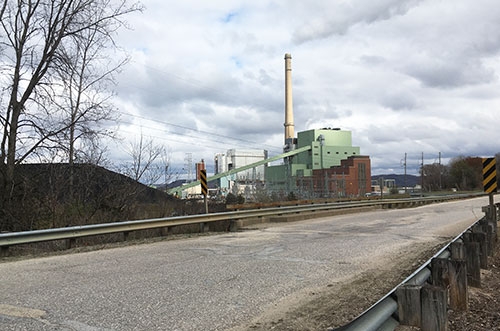You are here
Home ›Alliant Energy addresses plans for coal ash ponds at its Lansing Generating Station

by Julie Berg-Raymond
Interstate Power and Light Company, Alliant Energy’s Iowa energy company, held a virtual public meeting January 11 of this year regarding the coal ash ponds at its Lansing Generating Station located just south of Lansing along the Great River Road and the Mississippi River.
A written statement provided by Alliant Energy following the virtual meeting - which local attendees reported was frequently interrupted by audio disruptions - indicated that an Assessment of Corrective Measures study was discussed during the January 11 public meeting, as well as Alliant Energy’s work to meet requirements of the federal Coal Combustion Residuals (CCR) Rule.
CCR RULE
First issued in April 2015, the CCR regulates the disposal of coal ash in landfills and surface impoundments under Subtitle D of the Resource Conservation and Recovery Act. The rule “lays out a prescriptive, phased process for monitoring groundwater near our coal ash pond sites, identifying and reporting requirements, and addressing any needed corrective actions,” Alliant Energy’s written summary noted. “Our coal ash pond embankments meet all safety requirements and follow the CCR rule. We continue to comply with the groundwater monitoring process established by the CCR rule. We have collected information to meet groundwater standards at our Lansing Generating Stations. For sites that need more groundwater monitoring, we will perform it. If a corrective action is needed, we will take it, as prescribed under the CCR rule.”
Alliant’s written summary notes that “sampling results indicate the groundwater flowing under the existing ash pond meets the U.S. Environmental Protection Agency’s (EPA) standards. Further, the information confirms there is no direct concern to any wells that supply drinking water.”
In order to assess the water quality at and around the Lansing Generating Station, monitoring wells have been installed. According to Alliant Energy’s Senior Communications Partner Melissa McCarville, “there are nine shallow and four deeper wells at the Lansing Generating Station that have been installed since 2015. There is also one upgradient background well. The shallow wells average 21 feet deep. The deeper wells average 51 feet deep.”
Alliant contracts with professional staff familiar with government monitoring to test the wells at least two times per year. Water is analyzed by labs certified by the State of Iowa.
Doug Mullen, who lives across the roadway from the Lansing Generating Station, attended the virtual public meeting January 11 but was unable to ask questions after the Alliant Energy presentation, due to audio difficulties. In an interview after the meeting, Mullen said he was concerned about his private well, which is drilled down to 200 feet.
“A lot of the (private) wells are below the lower part of the ash,” he said. “I want assurances from people who know what’s going on to tell me - in public forums - that when I turn my water on, it’s safe,” he said.
In a phone interview after the January 11 virtual meeting, Alliant Energy’s Manager of Environmental Services Jeff Maxted addressed that question, saying, “the first thing we care about is the quality of drinking water. We actually have worked to look at drinking water supplies in the area and there is no indication of an impact.”
ASSESSMENT OF CORRECTIVE MEASURES
According to the written summary Alliant Energy provided following the virtual meeting, “we also shared information about a study we performed in response to the groundwater monitoring results, called an Assessment of Corrective Measures, and our upcoming pond and landfill closure projects. The pond closure project is scheduled to be completed by October 2023, and the landfill project will be completed shortly thereafter.”
During the phone interview, Maxted addressed the plan for closing the ash pond at the Lansing Generating Station, which is not a lined pond. “The pond met the standard in effect when constructed; the EPA is now requiring unlined ponds to close,” he said. “What we’re proposing is to consolidate the material and install a ‘final cover’ - a cap over the top, which keeps water out of the waste and helps protect groundwater.”
“Our company strategy consists of the closure of all of our coal ash ponds by the end of 2023,” the written summary noted. “The closure standards that we follow are modeled after the standards used for closing municipal landfills. We have already closed some coal ash ponds, we are in the process of closing others and the majority were closed by the end of 2021. After closure, we will continue to monitor our ponds for at least 30 years.”
McCarville said anyone who has concerns and questions is encouraged to contact Alliant Energy directly by calling 1-800-ALLIANT (800-255-4268).

